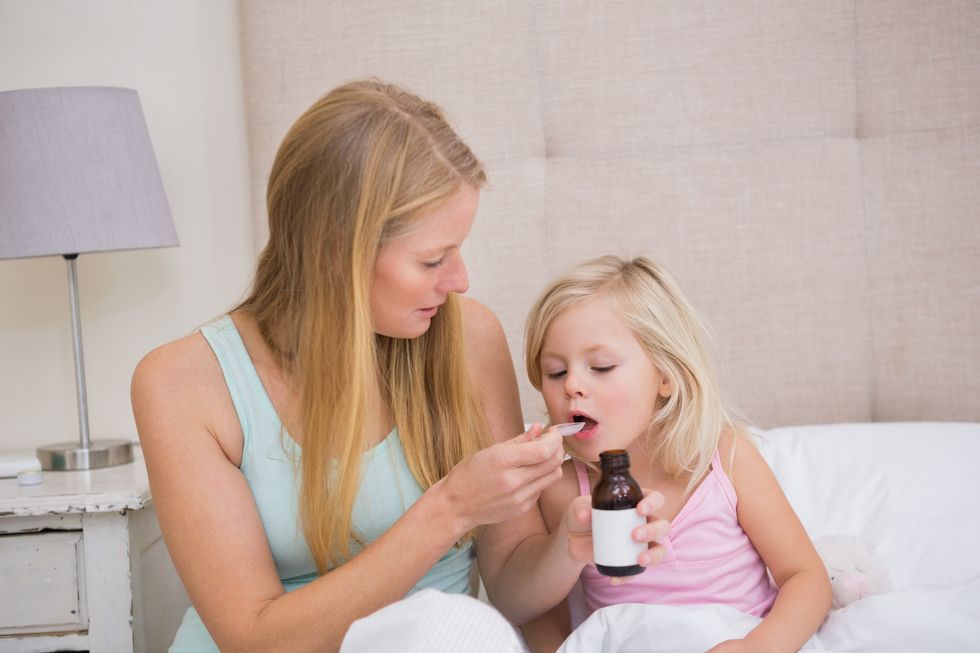Everyone says that when you have children, their stuff eventually takes over your entire house. My husband and I have two kids and, even though we said we wouldn't let their toys and tiny socks creep into every corner and crevice, they have. Most surprisingly, their stuff has even taken over our medicine cabinet!
From prescription and over-the-counter (OTC) medicines to creams and vitamins, our medicine cabinet is overflowing. Next to all the bottles and boxes is a pile of syringes and droppers from past and present medicines.
Despite what my medicine cabinet may look like, I like to stay organized. So when I open the medicine cabinet door and see chaos, I am tempted to throw out the open boxes and strewn syringes and droppers. But that's not a very good idea. I can't treat my medicine cabinet like a kitchen pantry by taking items out of their original packaging—even if it looks nicer and more organized.
Instead, here's how to keep an organized medicine cabinet—and why it's important to do so.
DO Toss Expired or Unused Prescription Medicines.
It is important to regularly check expiration dates and toss any expired medicines. But don't just toss them into the trash within reach of small children and pets. Visit the Food and Drug Administration's guidelines to learn safe and proper medicine disposal methods. Or look into the National Take-Back Initiative. If you have further questions, call your poison center at 1-800-222-1222.
DON'T Toss Boxes and Original Packaging.
Now that the expired medicines are gone, you may be tempted to keep tossing and throw away those OTC medicine boxes that seem to take up so much space. But don't. You'll want to hang onto those because they contain the very important Drug Facts label.
While that label doesn't seem too important when you're organizing, it is critical in the middle of the night when you're trying to reduce a fever or need a medicine for any urgent problem. The Drug Facts label contains important information that you should read every time you give the medicine to your child. The label lists active ingredients, uses, warnings, directions, inactive ingredients, questions or comments and other information. In the middle of the night, you’ll want to make sure you can give your child the correct dose, so keep that information handy.
In a time of urgency, be careful about which directions you're reading and following. Many families sometimes have two containers of similar products—like children's ibuprofen or acetaminophen—make sure you match up the right product with the right directions. Dosing varies from product to product, and directions can sometimes change. Following the directions on one box while using a different one—even if it's the same drug—is not safe. Follow the directions from the original packaging.
Keeping the original container with the Drug Facts label can also help you avoid dosing errors, such as giving too much medicine or giving a dose too soon.
DON'T Toss the Syringes or Dosing Devices.
Here's another good reason to keep those boxes: You can easily store the original dosing device with the right medicine. Many of these syringes or other dosing devices that come in children's OTC medicine boxes seem interchangeable—but they are not. Each dosing device is customized to its accompanying medicine. So it's really important to store the proper dosing device and medicine together.
My daughter often asks to play with the syringe and, while it does keep her occupied for a while, I have to remind myself that it could get lost or be hard to find when needed the most.
The medicine cabinet may get a little more unruly after the kids’ medicines take residence, but hanging onto those boxes and syringes is important for help keeping the family safe and healthy.
For more information about preventing medicine misuse in the home, visit ConsumerMedSafety.org and the Scholastic Over-the-Counter Medicine Safety website.
Support for the development of this material was provided by McNeil Consumer Healthcare.

Don't Toss Over-the-Counter Medicine Boxes and Dosing Devices
Here's how to keep an organized medicine cabinet to help keep your family safe. Start by saving the over-the-counter medicine boxes and dosing devices.
Nov 18, 2016
Mar 03, 2025
Pregnancy & Postpartum





